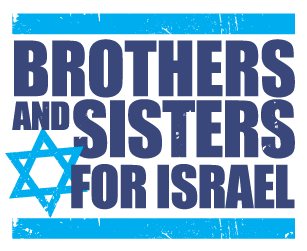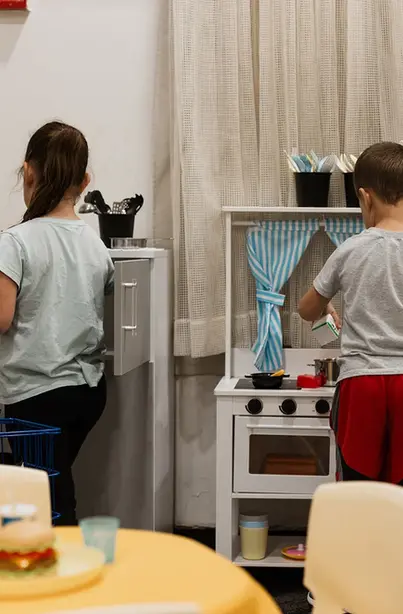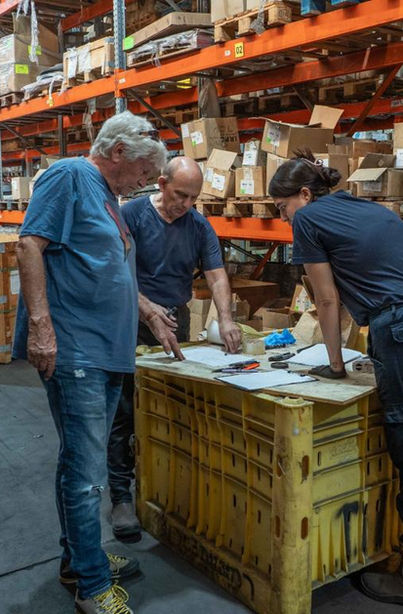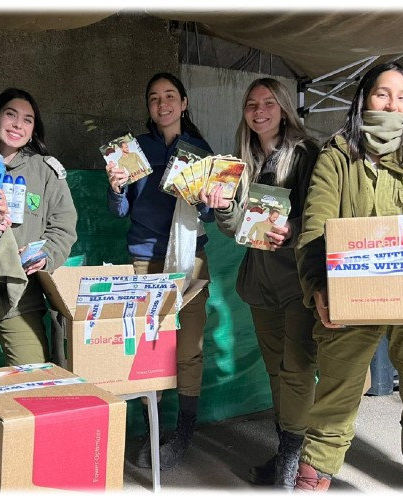
Current Projects
פרויקטים פעילים
Brothers and Sisters for Israel operate in the fields of education, community, leadership, aid, resilience and many other areas.
We invite you to get to know the various projects and be part of the exciting process of rehabilitation and hope.
צומחים יחד
"צומחים יחד" הינו פרוייקט משותף לחמ"ל, לסוכנות היהודית ולתנועה הקיבוצית ומטרתו מרכז סמינרים למכינות.
כיום פועל סמינר מכינות בנגב המערבי, בו מכינות מכל הארץ מגיעות לשבוע בנגב המערבי, הכולל לינה, התנדבות ותכנים. הלינה הינה באיבים (כפר עולים בתחומי מועצה אזורית שער הנגב);
ההתנדבות מתקיימת בשעות הבוקר, במרחב הנגב המערבי בתחומי חקלאות, טיפוח יישובים ושטחים פתוחים, שיפוצים, נקיונות ועוד; התכנים מורכבים משיח עם השותפים ועם אנשי המרחב מתחומים שונים ונועד להעמיק את היכרותם של צעירים עם סיפורו של הנגב המערבי - סיפור שלם של עבר, הווה ועתיד.

מיזם "בונים מחדש"
בזכות אלפי מתנדבות ומתנדבים, תורמות ותורמים ואנשי מקצוע מכל רחבי הארץ, קידמנו עד היום מספר פרויקטים משמעותיים בנגב המערבי:
כפר עזה שכונת הרצפות הירוקות -16 יחידות דיור מאוכלסות
ניר עוז שכונת החלוץ שיפוץ 17 דירות
כפר עזה שכונת נעורים 16 יחידות דיור שתי דירות - מאוכלסות
הבנייה כוללת גם זיכרון.
לבנות מחדש פירושו לעצור, להקשיב ולזכור ולהיות נוכחים בכאב של הקהילות כחלק בלתי נפרד מהדרך.
הדרך לשיקום ישובי הפריפריה עוד ארוכה. החזרה של התושבים מתקדמת לאיטה ואתגר בנית הקהילות ילווה אותן עוד שנים רבות.
אנו קוראים לכם לקחת חלק בסיוע לקהילות להשתקם בימים אלו אנו עומלים על פרויקטים חדשים
להצטרפות לחץ
בונים מחדש –החמ״ל האזרחי אחריות אזרחית. שותפות. בנייה של עתיד משותף.

סיפורי אוקטובר

Military Prep Programs - Leadership Training
Brothers and Sisters for Israel is committed to developing a new generation of responsible leaders dedicated to advancing the democratic values of Israeli society. So we are collaborating with the leadership-building Hechalutz Movement which operates pre-military preparatory programs and gap-year services offering high school graduates a unique educational framework.
The program, which combines studies, preparation for military service, and meaningful social activity, is designed to infuse the young leaders with a deep understanding of Zionism, liberal democracy, and social justice, while fostering a strong connection to their communities through social action. Participants engage in a comprehensive curriculum that combines academic studies, preparation for military service, and meaningful community involvement. The program includes team-building activities, volunteer work in communities impacted by the war, and educational tours. It is currently running in several locations throughout Israel.
Now, more than ever, when the country is experiencing political, social, moral and economic crisis, this framework addresses the critical need for young, responsible leadership, nurturing graduates who will play key roles in the IDF and guide Israeli society toward a brighter future.

Expanding Mental Health Support
Mental health professionals have reported a sharp increase in demand for psychological support following the events of October 7. Yet the number of trained professionals far exceeds the number of individuals in need. As the need for support grows, it is essential to not only increase the number of professionals but also expand the network of individuals capable of providing initial psychological assistance. This is where Brother and Sisters for Israel’s “Amit B’Kehila” (A Friend in the Community) program comes in.
Amit B’Kehila bridges this gap by increasing local capacity to provide primary mental health support to individuals experiencing mild distress to help them cope, manage their emotions and maintain emotional stability. Amit B’Kehila is working to achieve this increase by training students to provide this essential early support
Launched as a pilot program in the 2024-2025 academic year at Sapir College in Sderot, it will expand in 2025-2026 to collaborate with additional academic institutions. Students will combine theoretical knowledge and practical on-the-job training, equipping them with essential skills required in the mental health field. This approach emphasizes innovation and creativity to meet the evolving needs of the community while ensuring high professional standards.
After completing their training, students will serve as mentors in local welfare departments. They will receive psycho-social training at their academic institution, becoming knowledge ambassadors in the community. They will be guided by the program's operational framework in placement locations and will be compensated through living stipends.
The program is supported by the Day After Fund, the Rothschild Foundation, among other donors, contributing significantly to improving Israel’s mental health system and strengthening community resilience.

Bishvilenu: Offering a Path to Identity
BSI recognizes that the key to Israel’s future is cultivating a new generation of young Israelis who are caring, proactive, and engaged.
So, how do you inspire young people to embrace social responsibility and become active contributors to society?
BSI's approach is to provide transformative experiences that strengthen young people’s Israeli identities and demonstrate that every individual has the capacity to make a meaningful impact.
This is the backbone of “Bishvilenu” (“Our Journey”), an immersive three-day experience designed for young people aged 14-16 to explore their personal identity through the lens of Israel's Declaration of Independence. The program strengthens students' sense of belonging and boosts their confidence, all while encouraging active social engagement.
Throughout the trip, participants explore key foundational values such as freedom, justice, and personal responsibility. They reflect on their individual values and how they connect to their role as active contributors to a democratic society.
“Bishvilenu” was developed by BSI in collaboration with Pardes, an organization specializing in democracy education. Alongside learning about Israel's democratic values, the program also includes team-building and outdoor activities that promote a strong sense of belonging, fostering a long-term commitment to shaping Israel’s future.
At the conclusion of the program, participants sign a declaration of independence, committing to carry forward the mission of shaping a just and fair Israeli society. Asked to sum up the experience, one student said “Now we realize just how important our role is as the future of this country.”

Soldier Support Center
In October 2023, BSI established a Soldier Operational Support and Civilian Logistics Center in the north to provide essential aid and support to IDF forces across Israel. Initially set up as a northern counterpart to the southern logistics hub, it has since evolved into a national logistics center and plays a crucial role in ensuring the well-being and effectiveness of soldiers nationwide.
Operated by about 170 dedicated volunteers, the Center focuses on improving conditions for soldiers offering both physical and emotional support. It includes a variety of workshops such as carpentry which builds furniture for the field, metalworking to build heating stoves, and factories to manufacture rain shelters and shade nets. In addition, a logistics desk oversees the entire operation, coordinating a transportation network, also managed by volunteers.
Some of the key initiatives include the "Soldiers' Welfare Operations Room," which offers comprehensive support to military units by providing easy access to services and resources. Another notable project, "Logistics Tourism," invites groups and individuals from Israel and abroad to learn about the organization’s work and participate in volunteer activities supporting soldiers and their missions.
The Soldier Operational Support and Civilian Logistics Center is a vital program to ensure that soldiers receive the resources they need to succeed in their duties, all while fostering a powerful sense of community and solidarity, uniting volunteers in support of those who serve.

Innovative and Inviting Educational Environments
- How do you foster stability for young children after they are forced to leave their homes overnight?
- How can evacuated families even begin to adjust to their new situation if their children have no routine?
- Is it possible to create a space amid the chaos and uncertainty of emergency for children to be children?
These are the questions that ran through the minds of BSI volunteers at their Tel Aviv HQ soon after October 7.
The volunteers had been tasked with tackling a pressing issue relayed from the evacuee centers – dire lack of structure for preschoolers. After putting their professional heads together and visiting an evacuee center and hearing from evacuees, they knew what they needed to do: Provide stable, joyful spaces for learning and play for preschoolers affected by the war. In other words, creating kindergartens to act as safe havens for youngsters and provide an anchor of routine for all the family.
Within a few months BSI had established 160 kindergartens for displaced children across Israel. Developed by design and pedagogy experts with input from teachers and communities, these spaces proved to be much more than places to learn and play. Rather they became hubs of stability, resilience and hope for children, families, and staff, amid intense uncertainty and fear.
What began as a “tower and stockade” like effort, evolved into a pedagogical design program that creates an optimum environment for children to flourish, and empowers staff to build and fulfil their educational vision.
As evacuees began to return, this “renovation-come-community-building process has proved to be just as crucial. BSI is working in the north and the south with local educational teams to redesign spaces according to community values and needs.
The revitalized kindergartens serve as magnets attracting families by fostering a renewed sense of belonging and shared commitment for community rebuilding. For example in one returning southern moshav, within a month of the kindergarten opened, registration had tripled. It literally brought families home. The impact extends to educators—majority of whom were also displaced—by motivating them to restart, heal, and shape the future of their communities.

Providing Educational Staff for Regional Renewal
As evacuated communities begin to return home, ensuring access to quality, fully staffed educational services is a top priority. This is crucial not only to meet the heightened needs of children who have faced immense challenges, but also to provide families with the confidence they need to return. A strong educational framework is often the deciding factor for families hesitant to come back.
As part of BSI's support for communities in the north and south, we help local authorities address staffing gaps by identifying both existing unfilled positions and new roles -- such as teachers, classroom support, and social workers -- needed to meet the demands of returning families. BSI deploys expert HR professionals -- volunteers with backgrounds in human resources, pedagogy, and management -- to run recruitment campaigns, screen candidates, and place qualified staff quickly.
However, recruitment alone is not enough. We understand that retainingboth new hires and existing staff is crucial for ensuring a sustainable educational framework. In addition to filling positions, BSI works to maintain staff morale and commitment, recognizing that staff retention directly impacts the stability of the region and the likelihood that residents will remain. Our initiatives, including, transformative retreats for educators, innovation grant competitions for schools, and recognition events, ensure that education professionals are supported, motivated, and empowered to remain in the area, strengthening the foundation for long-term community recovery.
With this approach, BSI ensures that communities have the educational services needed for families to confidently return and stay, laying the foundation for a resilient future.

Inspiring Leadership within the Bedouin Youth
In response to the October 7th attacks and the ongoing war, BSI provided vital support to all impacted Israelis, including the Bedouin community in the Negev. Our efforts involved delivering food, medical care, and creating safe spaces for affected families. This emergency response strengthened connections between BSI volunteers and the community, highlighting an opportunity to work together for the long-term, aligning with our commitment to fostering an inclusive Israeli society.
Discussions with partner organizations highlighted the empowerment of Bedouin youth as a key focus for our efforts. BSI runs educational and social initiatives aimed at leadership and integration into Israeli society -- essential for youth empowerment. Bedouin youth face challenges such as limited Hebrew proficiency and a shortage of Hebrew-speaking educators, which restrict their access to higher education and job markets. They deserve leadership development opportunities equal to those of their Jewish peers.
BSI's programs include:
· Small group Hebrew language discussions: Led by BSI volunteers, these sessions enhance Bedouin high school students' conversational Hebrew through practical experience.
· Educational leadership program with Desert Stars: This program supports five matriculation units while developing leadership skills and fostering cross-cultural interactions.
- “Identity Journeys”: These excursions help Bedouin youth build resilience and deepen their self-identity.
· Jewish youth visits to Bedouin communities: This initiative fosters awareness and mutual interaction, bridging cultural divides between the two societies.
By fostering leadership and facilitating the integration of Bedouin youth into Israeli society, these programs aim to cultivate active citizens who will lead their community’s development. This process also deepens their sense of belonging, encouraging greater integration and stronger contributions to Israel's future.

Healing from the Heart: Empowering the Wounded
Designed to support and rehabilitate those impacted by the attacks of October 7th and the ongoing war, as well as their families and caregivers, Brothers and Sisters at Heart offers a path to recovery and renewed strength. The program offers a combination of personal and community guidance to help those who were injured or wounded to rebuild their lives and strengthen their mental and emotional resilience.
Brothers and Sisters at Heart provides a variety of activities such as art therapy workshops, career counselling, language classes, music projects, storytelling initiatives and more. There are one-time workshops and ongoing programs – all personalized and tailored to the needs of the wounded or injured individuals or their families or caregivers. Volunteers in various fields, including language teachers, music instructors, writers, and screenwriters, play an essential role in providing valuable guidance, enrichment, and support as those whose lives have been turned upside down regain their footing and find their place. These efforts are made possible through collaboration with medical organizations, the Ministry of Defense and other NGOs.
Volunteers are also working on ways to integrate those who were wounded into Brothers and Sisters for Israel so they can continue to contribute to Israeli society in a significant way.
By fostering a strong community and providing vital resources, the program works to ensure that those recovering from their wounds are not only supported but empowered to heal and move forward.

Our Turn – Initiating New Young Communities
BSI is committed to investing in young leaders who take responsibility for their communities and help build a stronger, more resilient Israeli society.
Torenu (meaning "our turn") – a partnership with Dror Israel – is one example of how we are empowering young adults to play an active role in Israel’s recovery and renewal. Through this initiative, groups of young professionals (ages 25-35) move to communities deeply affected by war in the Gaza border region and northern Israel -- and commit to working in education, therapeutic professions, and community development work. Their presence not only fills urgent needs in these regions but also strengthens community resilience by fostering a culture of service and shared responsibility.
Participants live together in communal housing, creating a supportive environment that blends meaningful work with a rich community life. Learning sessions, shared Shabbat celebrations, trips, and seminars deepen their engagement, while mentorship and internal leadership teams help develop their skills as changemakers.
The program is already making an impact, with thriving groups in the western Negev’s Eshkol and Sha’ar HaNegev Regional Councils. Building on this success, BSI is working to expand the initiative to additional locations in both southern and northern Israel, ensuring that more communities benefit from the leadership and commitment of these young professionals.
By engaging young people in purposeful work and shared living, BSI is cultivating a new generation of active citizens -- individuals who will continue to strengthen Israel’s social fabric and play a vital role in shaping a value-driven future.

Northern Emergency Operations Center
Medical assistance in isolated and challenging areas in terms of accessibility given the intense warfare in the north. The method of operation is to provide medical personnel to the wounded or to provide the wounded to medical personnel. The assistance will be made possible through the use of diverse mobility and maneuverability options.
An in-depth review of the issue revealed that, given the intense warfare in the North, a marked lack of potential to provide medical assistance and mobility in the field is expected.
The capabilities developed by the Northern Emergency Response Team are a tool for helping save lives in times of emergency, through recruiting dozens of mobility and medical volunteers and establishing an infrastructure for their operation when necessary.
Partners and collaborations:
The Response Team has established cooperation with various official bodies, including a joint system with MDA.






